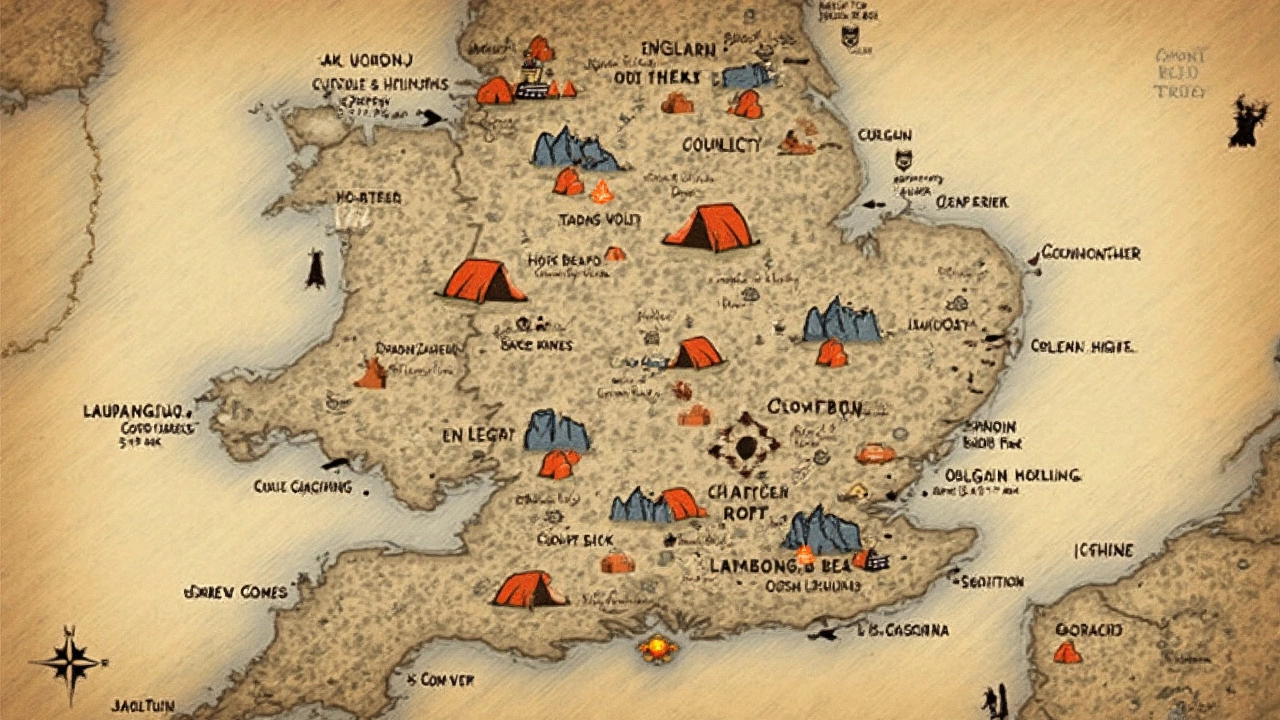Can You Get Fined for Wild Camping in England?
 Mar, 27 2025
Mar, 27 2025
Ever dreamt of pitching your tent under a starlit sky in the English countryside? Well, before you pack your bags, there's some stuff you need to know about wild camping in England. Most of the time, it's a big no-no unless you’ve got permission from the landowner. The laws here are quite strict compared to places like Scotland where you can camp freely in most areas. So, can you get fined? The short answer is yes, if you camp somewhere you shouldn’t be.
Let's talk about where you're allowed to pitch your tent. Some national parks, like Dartmoor, have specific areas where you can camp legally. Outside these zones, you're risking a fine or getting moved on by the local authorities. It's always best to check beforehand, either online or with local park information centers.
And about those fines—if you're caught wild camping without permission, you could face fines or at least a stern talking-to from the landowner or local authorities. They take conserving the natural beauty seriously, and it’s all about keeping the land pristine and sustainable.
If you’re planning on giving it a go, though, remember to follow the Leave No Trace principles. This not only helps protect the environment but also keeps the local wildlife safe. Look out for local advice and guidelines—they're there to help you have a great outdoor experience without stepping on anyone’s toes.
- The Law on Wild Camping
- Where Can You Camp Legally?
- Potential Fines and Consequences
- Tips for Responsible Camping
The Law on Wild Camping
In England, the freedom to wild camp is more restricted than you might hope. Unlike Scotland, where the right to roam allows you to camp in most unenclosed areas, England has stricter rules. Everywhere except Dartmoor National Park requires you to have permission from the landowner before you set up camp.
The Trespass Act of 1824 is a key piece of legislation to know. Technically, if you camp on private land without permission, you might be committing a civil trespass. This won't typically lead you to a court, but you could be asked to leave by the landowner or local authority. Police generally won't get involved unless there's a breach of the peace.
"While enjoying the countryside, respect the privacy and livelihood of those who live and work there." - The Countryside Code
So, is it ever okay to wild camp? Yes, if you do it smartly. Getting the landowner's permission can often be as simple as knocking on a door and asking politely. National parks like Dartmoor offer designated areas where you can camp legally. And let's not forget about those occasional 'freedom to roam' campaigns that advocate for more relaxed rules.
Here’s a quick look at what’s been happening lately in the UK:
| Year | Campaign Name | Goal |
|---|---|---|
| 2023 | Right to Roam | Expand access to wild camping |
| 2024 | Campers Unite | Increase legal camping zones in parks |
Rules are rules, but there's still plenty of space to enjoy the wilderness responsibly. Just keep it legal and respectful, and your wild camping adventures can be both thrilling and hassle-free.
Where Can You Camp Legally?
If you're itching to set up camp in England's lovely outdoors, you’ll need to know where you can do it without breaking any rules. While wild camping is generally restricted, there are still some spots that welcome campers legally.
The only place in England where you can enjoy wild camping legally without prior permission is Dartmoor National Park. This beautiful area allows you to immerse yourself in nature, but remember, it’s limited to specific areas within the park. It’s always wise to check out Dartmoor's official camping map before heading there.
Now, if Dartmoor doesn’t fit your plans, there’s something called "landowner’s permission" which is key in other parts of England. It might sound daunting, but it’s really just a matter of asking the landowner directly if you can camp on their land. A polite ask often goes a long way, and you might just find a perfect spot where you’re welcome.
For those who’d rather play it completely by the book, and perhaps with a few more facilities, have a look at official campsites. England has plenty and they’re located in some seriously stunning places. Not only do they offer security in terms of legalities, but they also provide amenities like toilets and showers—things you might start missing after a few days in the wild.
Also, did you know you can camp on most of the UK’s canals and river towpaths? Well, you can, provided it’s a recognized mooring area and you have the necessary permits. You can get these from the Canal and River Trust.
- Dartmoor National Park (specific areas)
- Private land (with owner’s permission)
- Managed campsites (plenty across the UK)
- Canals and river towpaths (with permits)
Always keep in mind to double-check local rules wherever you plan to camp. Nothing ruins a trip like being asked to pack up and leave. Keep these tips in mind, and you’ll be well on your way to enjoying the great English outdoors lawfully and happily.

Potential Fines and Consequences
So, you might be wondering, what exactly happens if you decide to go wild camping in the wrong spot? Well, in England, if you camp without permission, you could face anything from a warning to a fine. It all really depends on where you are and who catches you.
In many areas, if a landowner finds you, they might just ask you to leave. But if you’re in an especially sensitive spot or causing damage, the local council or police could get involved, and that’s when fines can come into play. These aren’t a one-size-fits-all; they can vary based on the situation. But trust me, it’s not a risk worth taking if you’re on a budget.
Aside from fines, you might also deal with the embarrassment of being asked to pack up and leave in front of other campers or hikers. A bit of a mood killer, right? Plus, getting caught might mean you'll have to find a new spot quickly, which is no easy feat as night falls.
But hey, it’s not all doom and gloom. If you do your homework—like checking if camping is strictly regulated in the area you want to visit—then you can avoid these headaches. Remember, it’s not just about avoiding fines but also respecting the land and those who look after it.
Tips for Responsible Camping
So, you're all set for a wild camping adventure in England? Before you go, it's important to know how to do it responsibly. Not only does this ensure you have a great time, but it also helps preserve the environment for others. Let's break it down.
Firstly, always follow the Leave No Trace principles. This means cleaning up all your rubbish and leaving the campsite as you found it. It might be tempting to leave a little behind, especially when it's something small, but every bit counts. Take a trash bag and plan to pack everything out.
Then, there's campfire safety. In many places, especially during dry seasons, open fires can be a no-go. Always check for fire restrictions and if it's allowed, keep your fire small, controlled, and within a designated fire ring if available. A portable stove is often a better option.
When it comes to picking a spot to camp, find flat, stable ground. Set up at least 50 meters from lakes or streams to help keep water sources clean. Remember, you're a visitor in nature's home; let's keep it comfy for the next guests – wildlife!
- Stick to existing paths and campsites to limit erosion.
- Use biodegradable soap for cleaning up.
- Delay wildlife feeding—it's not helping them, even if it feels like it.
Brushing up on legal camping locations around UK campsites is wise too. Legal spots usually have some amenities or information boards telling you what’s okay. Always double-check if you need a permit.
And lastly, respect the peace of the place. Keep noise levels down, avoid loud music, and instead, embrace the sounds of nature. Your camping experience will be more enjoyable and so will others'.
By following these simple tips, your wild camping journey can be both fun and friendly to the environment. It's all about enjoying the great British outdoors while keeping it lovely for those who'll camp there next.